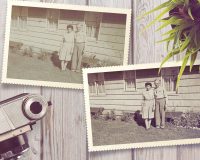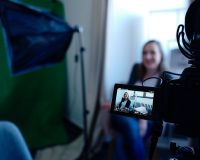Since October is Family History Month, I was already thinking about this subject for a new blog article when a Canadian writer and film producer named Robb Lucy asked that I make a contribution to his new book. Scheduled for publication in the Spring of 2009, it is tentatively titled “Legacies aren’t for dead people – It’s about creating and really enjoying yours… now!”
Robb wanted to get additional perspectives on this specialized form of storytelling from other professional biographers, videographers and members of the Association of Personal Historians.
In helping so many people create personal and family histories over the years, I have observed that the process typically produces three distinct benefits for the people involved. These I call The Dynamics of Personal Histories.
1. Connection
When reviewing and assessing a lifetime of memories, people begin to connect or reconnect with their roots and their core values. Instead of focusing on all the things they may have failed to do, they begin reflecting on all the things they did accomplish and how their lives have had a positive impact on so many others. This realization helps them connect to their family of origin, their childhood, their past. It serves as a reminder that they have done some good things along the way and in the process, it improves their sense of self-worth.
2. Recognition
Most all biographies involve family members and the bonds that tie them together. At the very least, they include a close circle of friends and associates. But how well do people really know each other and what of younger or distant relatives who may never have known the subject very well? By creating a personal history, many details about a person’s life are revealed. Their thoughts and feelings are expressed, events big and small are recounted, and their unique personality shines through. These things help the larger body of family and friends to understand the person (and often themselves) better. New connections are made, old bonds are strengthened or renewed, and the group recognizes how that person fits into to their collective lives.
3. Pride
First, there is pride in the person being profiled; pride that their story is now known by the family… and pride that generations to come will learn it too. And then there is pride in each member of the family… proud to be part of Grandma or Grandpa’s family… proud to be connected to the larger group. It is an affirmation that all their lives are rich with stories worth passing on to those who follow.
Robb is interested in using lots of quotes and stories from a variety of other sources including individuals that have created personal or family histories for themselves and those who may be considering it.
He usually asks the two simple questions below when interviewing subjects.
1. Have you benefited from another’s Legacy? And if the person who created it is still alive, are they enjoying it too, knowing it will still be there when they’re gone?
2. Are you creating a Legacy? Is it one you and others can enjoy now… knowing that when you go‚ you’re going to leave a positive mark?
If you would like to contribute a story to Robb’s book, you can send it to his blog at: http://legacysmile.blogspot.com/
Stefani Twyford is a personal historian and video biographer sharing life stories, connecting generations and preserving legacies. To learn more, visit her web site, find her on Twitter as @stefanitwyford, visit the Legacy Multimedia Facebook Fan Page, or send her an e-mail.








